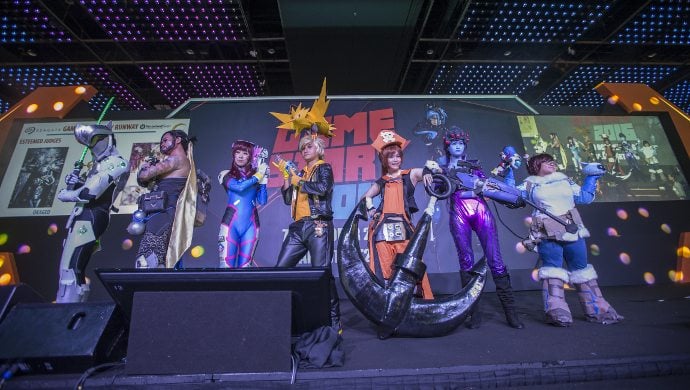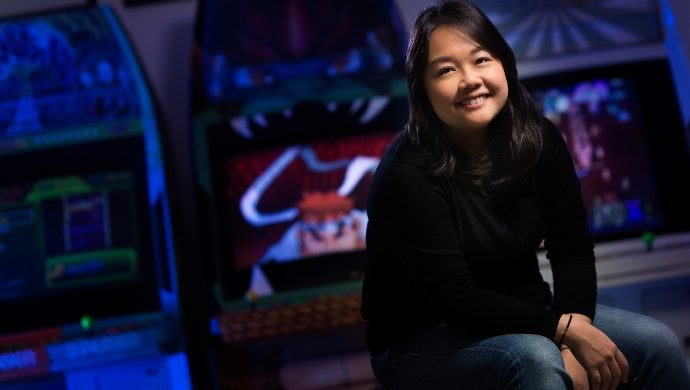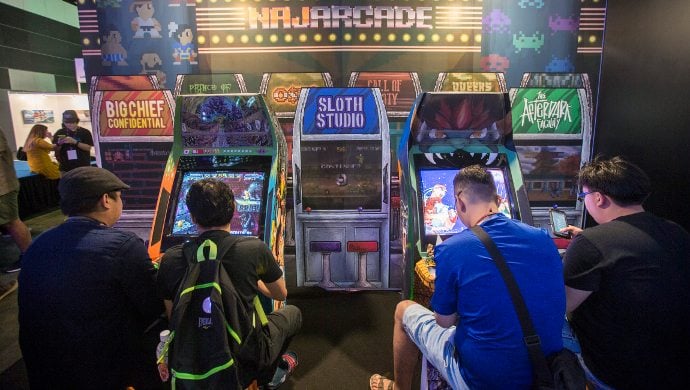The founder of Singapore’s three-year-old gaming convention says that the scene here is improving, but there is still a long way to go

The late 1990s to early 2000s was a glorious time for gamers.
Like many teenagers, the original PlayStation was a fixture in my after-school pastime. You see, unlike the preceding 16-bit video game consoles, which were all cartridge-based, the PlayStation games’ compact disc format allowed them to be duplicated easily and sold.
Some duplicates or pirate copies in Singapore went for as low as S$4 (US$2.9) – the original price of these games cost about 10 times more. It was not uncommon to see fly-by-night stores that sell pirated games pop up at neighbourhood shopping outlets, then get raided by the police a few weeks later, only to reopen again at some other outlet.
I remember spending countless hours skating through a half pipe in Tony Hawk Pro Skater 2 and cutting down monsters as Cloud Strife in the acclaimed role-playing game Final Fantasy 7. Good memories.
In the same period, competitive online computer games such as Half Life: Counterstrike, Quake 3 Arena and Starcraft, were beginning to take centre stage.
This was due in part to affordable broadband prices, another part due to lowering costs of computer hardware.
Gamers also flocked to cyber cafes or LAN shops. These places were dark and dingy, lit only by the glare of computer monitors, and roared with the sounds of gunfire, explosions, adolescent yells and banging on keyboards.
The offline battle arena was also thriving. Gaming arcades were packed with teenagers pitting their virtual fighters against each other in popular games such as Street Fighter and Marvel vs Capcom.
Also Read: Games streaming firm Kamcord helps you make money from your fans’ antics
Indeed, it was boom time for video gaming for Singapore. But despite this, the gaming community remains rather insular.
Sure, every now and then you have the midnight launch events for the latest Blizzard games or game advertisements plastered on the billboards of public transport stops, but the scene never quite took off the same way it did in the US or South Korea.
That is, to say, elevating gaming and gamers to a larger public sphere.
Take South Korea for example, competitive gamers are treated like rock stars. They get six figure contracts and play to a fanbase of thousands. Matches are even set in stadiums where rabid screaming fans cheer them on.
Some Singaporeans are looking to change that.
Bringing the gaming community front-and-center
Elicia Lee is one such individual. She is the former Marketing Manager and APAC e-commerce manager of Electronic Arts (EA), the gaming publisher that released renowned games such as the FIFA series and Assassin’s Creed series.
In 2013, she left the job to start her own digital marketing agency, Zombit. And in 2014, decided to take the plunge to launch one of Singapore’s first few gaming conventions called GameStart Asia through her events company Eliphant.

Elicia Lee, co-founder of Zombit and Eliphant
The idea was to provide a conducive space for gaming geeks regionally to gather and celebrate their shared love for video games — whether it be through gaming tournaments, showcasing games from local indie developers, displaying cosplay getups or letting ageing gamers get a nostalgia rush through retro gaming sets.
And ultimately, this was to help put Singapore on the gaming map.
“At EA, we used to run small community events, and we would always see passionate a lot of passionate fans turning up,” says Lee, in an interview with e27.
“There were other gaming events, as well, but as a gamer myself, they were not quite what I expected them to be,” she says, explaining the origins of GameStart Asia.
Yes, despite the fanbase, Lee says gaming events did not provide the results publishers were expecting to reap.
Not a big market … yet
“The unfortunate reality is that Singapore generally gets left out because we are not a big market. We are also a challenging market because Southeast Asia is huge. It has huge potential, but we are kind of split up. We have cultural and language differences,” she says.
Another problem was that gaming industry executives are not actually gamers themselves, so many of them are focused on only the ROI.
Thus, it was difficult to prove to the big gaming publishers that hosting bigger gaming events with more content in Singapore was a worthwhile investment.
Also Read: You need to run your game studio like a startup: Altitude Games’ CEO
Lee had about seven months to take the idea to fruition for the first iteration of GameStart Asia.
“It was a YOLO (You Only Live Once) moment for me. A lot of people were like ‘uh, no one is going to come for this.’ But we were very lucky that Blizzard, Playstation and Bandai were willing to take a risk on us for the first show,” she says.
Globally, the E3 and Tokyo Game Shows are some of the more renowned video gaming conventions. Lee says she wants to bring a bit of that concept, but also tailor it uniquely to the Southeast Asian market.
And that means creating a balance between showcasing big budget video game titles and indie games from local developers.

Retro games galore!
“As you can see in the hall, the content is evenly split between the big boys who show all the sexy games, and the local developers. There is also more than just video gaming — we have board games, card games, as well as local artists,” says Lee.
Growing e-sports as a career and business
Another integral part of GameStart Asia is its e-sports segment. This year, it flew in international players from overseas to compete with local players in games such as Street Fighter V, Tekken 7, and more.
As mentioned previously, the gaming scene never reached the same level of ferventness experienced in South Korea.
In fact, the e-sports scene has taken a dive in recent years. The most online competitive gaming event, World Cyber Games, which once hosted 800 contestants from 78 countries, has experienced a dive in participation (Singapore hosted the finals once, in 2005). Some cite new players in the competition scene as a factor.
Also Read: In photos: All fun and games at Touchten headquarters
Additionally — and more importantly — the perception of competitive gaming as a hobby and not a serious career pursuit has not changed much.
“Gaming is still seen as something you shouldn’t do too much of; it’s not something you look at as a valid hobby or even a career option,” says Lee.
Even many gaming publishers were not on board.
“Back when I was at EA, e-sports wasn’t even really a word that was discussed. They held small tournaments but they didn’t understand how a regular tournament league would build a community of hardcore gamers around the franchise, who would then become loyal to your company and support you,” says Lee.
But she believes this perception may soon change, due in part to live streaming platforms such as Twitch.
Changing mediums, changing perspectives
Previously, if you wanted to see an online gaming competition, you went to a cyber cafe where it was hosted. Or if it’s a competition held internationally, you watched a replay of it on YouTube or downloaded a copy of the video.
Now, audiences can watch video game matches similar to the way international football fans watch matches on TV, cable or streaming video. And that presents business opportunities.
“With live streaming, it has become more valuable for sponsors, because now they get branding and stuff, which traditional TV has done in the past. But now because very little people watch TV, [advertisers] are switching to the online medium,” says Lee.
At GameStart Asia, Lee works proactively with professional gamers to work out sponsorships and other revenue streams.
One of the gamers is Ho Kun Xian. An avid fighting game buff since the age of six, Ho has gone on to win tournaments in cities such as Las Vegas, and has bagged around US$150,000 in prize money.
Like any athlete, he has a strict training regime. Before tournaments, he spends up to 8 hours a day training his character as well as studying his opponents’ playing styles.
Today, Ho is sponsored by gaming hardware giant Razer, and produced fighting game content for the company.
Winning over corporates is one hurdle; getting the government to recognise e-sports as a legitimate professional sports is another.
Also Read: In photos: A games studio that sees themselves as ‘modern craftsmen
But Lee is confident that the government will soon see the value of it.
“Just like how Formula 1 is bringing in tourism dollars and puts Singapore on the map, similarly, e-sports has the potential to do that — because e-sports is a global thing,” she says.
“At GameStart Asia, we livestream our competition stage, but half of the audience is actually from the USA — which is cool right, because they are seeing the kind of content we have in Asia? Likewise in Asia, we are seeing US content, so it is made things a lot more global. This opens up more opportunities for sponsorship, and for government agencies — which means more revenue,” she adds.
Ultimately, the perception of gaming would change because gamers get married and pass on their passion to their kids.
“As gamers of our generation grow up and have kids, and encourage our kids to play games, I think e-sports will become more viable because of the new mindsets,” Lee concludes.
—
Image Credit: Eliphant
The post Is Singapore’s gaming scene levelling up? GameStart Asia’s Elicia Lee shares her views appeared first on e27.